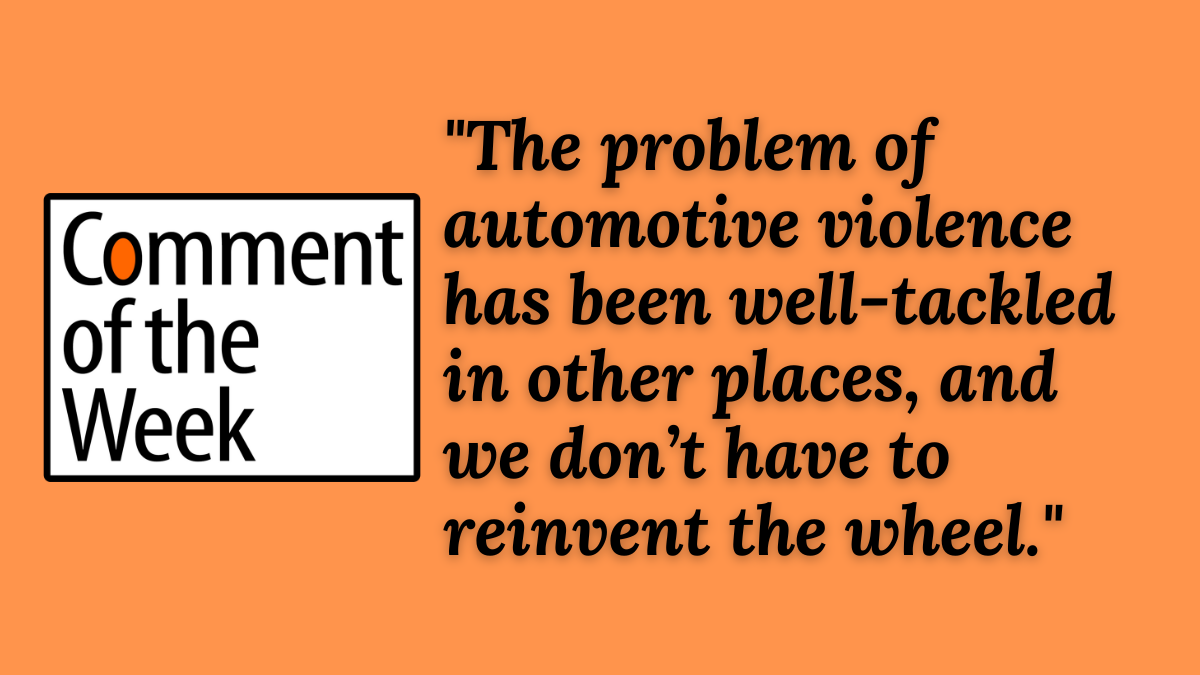Last week’s post, about how Multnomah County wants to end traffic deaths, described a Multnomah County report on traffic deaths that took an epidemiological perspective. It offered a sensible range of recommendations, some of which were a first, including working with state and city officials to increase the registration fee for heavier and taller, non-commercial vehicles.
What was appealing about the report was that much of it was common sense to people already engaged in trying to make our streets safer, so the County’s quantitative analysis of the problem was a welcome contribution.
But BikePortland commenter Charley pointed out the obvious, what is missing is not good ideas, but political will. And he described what it would take to get everyone on board with tackling traffic deaths.
Here’s what Charley wrote:
This kind of reminds me of that “Step 3: Profit” meme. There’s a missing step in the report.
The list of proposed policies mentioned in the report is very reasonable and would head us in a better direction. The problem of automotive violence has been well-tackled in other places, and we don’t have to reinvent the wheel.
What’s missing is Step One: building the political will for those policies and standing up the transportation alternatives that allow people to go about their lives without feeling like their freedom has been stolen.
Many of the policies would force driving voters to endure slower travel, more commuting time, with worse traffic, or even potentially force drivers onto bikes or mass transit unwillingly. As much as us transport nerds understand the benefits of that tradeoff, the average voter will likely hate it.
There’s no guarantee that voters will always be able to live near their job, or near the current bus lines- not to mention people working multiple jobs every day. Some people have co-parents who live on the opposite side of town, but need to shuttle children home from school daily while the co-parent is at work. Contractors work all over the metro area. Some people cannot even fathom the idea of riding a bike in the rain in the winter.
We all have a limited number of hours per day and we have to acknowledge that these policies would increase the amount of time people “spend” on getting around. Less recreation time, less work time, less family time. That’s a hard sell.
Without transportation alternatives in place, forcing people like this into a slow-car or low-car life will probably generate a lot of resentment.
Even if the policies work, would voters care? Just reading the article, a quarter of victims were homeless and four out of five tested positive for intoxicants. Most people probably think “it can’t happen to me”… and from those figures, they’re not entirely wrong.
That’s why the killing of Jeanie Diaz was such big news: she was a “normal” person doing a “normal” thing during “normal” daylight hours. This problem usually isn’t “personal” to the average voter: they don’t see themselves at risk.
As long as this problem is concentrated in less politically engaged constituencies, there will be less political will for the kind of shift that would save lives.
So I wish our leaders would spend more time creating politically attractive alternatives and thinking about how to generate political will for the shift. In a democracy, policy is accountable to the voter, and voters don’t generally vote for deprivation. In the absence of a personally motivating purpose and attractive transportation alternatives, all we have to sell is… slower driving times and traffic. That’s a problem!
Thank you Charley and everyone else who commented last week. Your perspectives are an invaluable addition to our work. You can read Charley’s comment under the original post.


